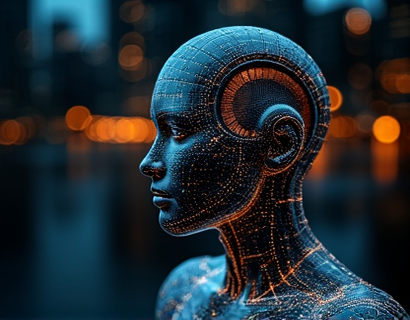Crypto and AI: Pioneering Enhanced Digital Experiences for the Future
The intersection of cryptocurrency and artificial intelligence (AI) is rapidly transforming the digital landscape, creating innovative solutions that enhance user experiences across various applications and services. As technology continues to evolve, the integration of these two powerful forces is redefining how we interact with digital platforms, making them more efficient, secure, and user-friendly. This article explores the latest advancements in this cutting-edge field, offering insights into how crypto and AI are shaping the future of digital services.
The Rise of Cryptocurrency
Cryptocurrency has emerged as a revolutionary financial technology, enabling decentralized transactions and providing users with greater control over their assets. Bitcoin, Ethereum, and countless altcoins have paved the way for a new era of digital finance, characterized by transparency, security, and accessibility. The decentralized nature of cryptocurrencies eliminates the need for intermediaries, allowing for peer-to-peer transactions that are faster and often cheaper than traditional banking methods.
As the adoption of cryptocurrency grows, so does the demand for innovative applications that leverage its unique properties. From decentralized finance (DeFi) platforms to non-fungible tokens (NFTs), the crypto space is teeming with opportunities for developers and entrepreneurs to create solutions that cater to the evolving needs of users.
The Role of Artificial Intelligence
Artificial intelligence, on the other hand, is revolutionizing how we process and analyze data. With the ability to learn from vast amounts of information, AI algorithms can identify patterns, make predictions, and automate tasks, leading to increased efficiency and improved decision-making. In the context of digital services, AI enhances user experiences by personalizing interactions, optimizing processes, and providing valuable insights.
AI technologies, such as machine learning and natural language processing, are being integrated into various applications, from chatbots that provide customer support to recommendation systems that suggest products based on user behavior. The combination of AI with cryptocurrency creates a powerful synergy that can lead to more secure, efficient, and user-centric digital experiences.
Innovative Applications at the Intersection of Crypto and AI
The convergence of cryptocurrency and AI has given rise to a plethora of innovative applications that are transforming the digital landscape. Here are some notable examples:
1. Smart Contracts
Smart contracts are self-executing contracts with the terms of the agreement directly written into code. They run on blockchain technology, ensuring transparency and security. AI can enhance smart contracts by enabling them to learn from past transactions and adapt to changing conditions. This can lead to more efficient contract execution and reduced risks for all parties involved.
2. Fraud Detection and Prevention
In the world of cryptocurrency, security is paramount. AI algorithms can analyze transaction patterns to detect anomalies and potential fraud. By continuously learning from new data, these systems can improve their accuracy over time, providing users with a safer environment for their digital transactions.
3. Personalized Financial Services
AI can analyze user behavior and preferences to offer personalized financial services in the crypto space. For instance, AI-driven platforms can recommend investment strategies based on individual risk tolerance and market trends, helping users make informed decisions about their cryptocurrency investments.
4. Enhanced Trading Algorithms
Algorithmic trading has become increasingly popular in the cryptocurrency market. AI can optimize trading strategies by analyzing market data in real-time, identifying trends, and executing trades at optimal times. This can lead to higher returns for investors and a more efficient market overall.
5. Decentralized Autonomous Organizations (DAOs)
DAOs are organizations that operate through smart contracts on the blockchain, allowing for decentralized decision-making. AI can play a crucial role in DAOs by analyzing data and providing insights that inform governance decisions. This can lead to more effective and democratic organizational structures.
The Impact on User Interactions
The integration of cryptocurrency and AI is significantly enhancing user interactions with digital services. Here are some ways in which this transformation is taking place:
1. Improved User Experience
AI-driven applications can provide users with a more intuitive and personalized experience. By analyzing user behavior, preferences, and feedback, these applications can tailor their offerings to meet individual needs, resulting in higher satisfaction and engagement.
2. Streamlined Processes
The combination of AI and cryptocurrency can streamline various processes, from onboarding new users to executing transactions. For example, AI can automate KYC (Know Your Customer) processes, making it easier for users to access services while ensuring compliance with regulations.
3. Enhanced Security
Security is a top concern for users in the digital space. The integration of AI can enhance security measures by providing real-time monitoring and threat detection. This can help protect users' assets and build trust in digital services.
4. Greater Accessibility
AI can help make cryptocurrency and digital services more accessible to a broader audience. By simplifying complex processes and providing user-friendly interfaces, AI-driven applications can attract users who may have previously been intimidated by the technology.
Challenges and Considerations
While the integration of cryptocurrency and AI presents numerous opportunities, it also comes with challenges that must be addressed:
1. Regulatory Concerns
The regulatory landscape for cryptocurrency is still evolving, and the integration of AI adds another layer of complexity. Companies must navigate compliance requirements while innovating, which can be a challenging balancing act.
2. Data Privacy
AI relies on data to function effectively, raising concerns about data privacy and security. Companies must ensure that they handle user data responsibly and transparently, building trust with their users.
3. Technical Limitations
While AI has made significant advancements, it is not without limitations. Ensuring that AI algorithms are accurate and unbiased is crucial for maintaining user trust and delivering effective solutions.
The Future of Digital Services
The future of digital services lies at the intersection of cryptocurrency and AI. As these technologies continue to evolve, we can expect to see even more innovative applications that enhance user experiences and redefine how we interact with digital platforms. Here are some trends to watch for:
1. Increased Adoption of Decentralized Finance (DeFi)
DeFi platforms are gaining traction as users seek alternatives to traditional financial systems. The integration of AI can enhance DeFi applications by providing users with personalized financial advice and optimizing investment strategies.
2. Growth of AI-Powered Trading Bots
As the cryptocurrency market becomes more competitive, AI-powered trading bots will become increasingly popular. These bots can analyze market data and execute trades on behalf of users, making it easier for individuals to participate in the market.
3. Expansion of AI in Customer Support
AI-driven chatbots and virtual assistants will play a crucial role in customer support for cryptocurrency platforms. By providing instant responses and personalized assistance, these AI solutions can improve user satisfaction and retention.
4. Enhanced Data Analytics
As more data becomes available, AI will play a vital role in analyzing and interpreting this information. Companies that leverage AI for data analytics will gain valuable insights that can inform their strategies and improve their offerings.
Conclusion
The intersection of cryptocurrency and artificial intelligence is paving the way for enhanced digital experiences that are more secure, efficient, and user-friendly. As these technologies continue to evolve, they will reshape the landscape of digital services, offering innovative solutions that cater to the needs of tech-savvy individuals. By embracing the potential of crypto and AI, we can look forward to a future where digital interactions are more seamless and enriching than ever before.










































